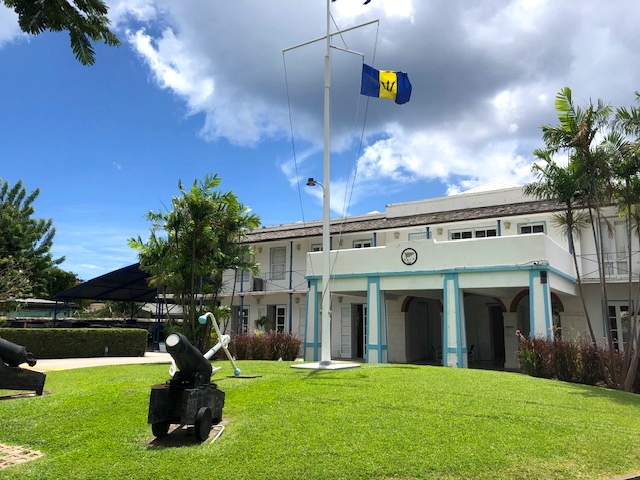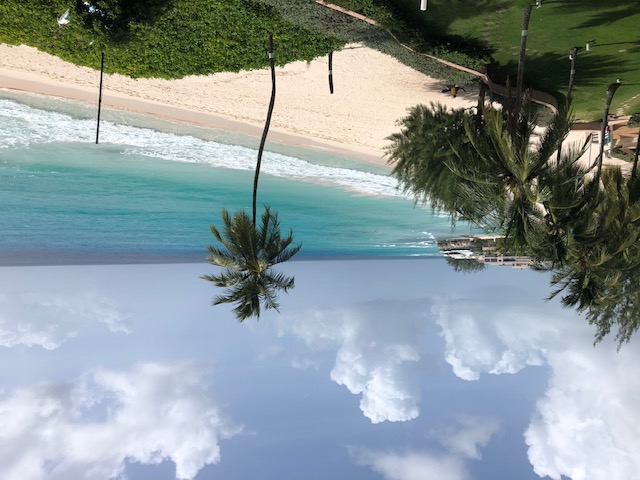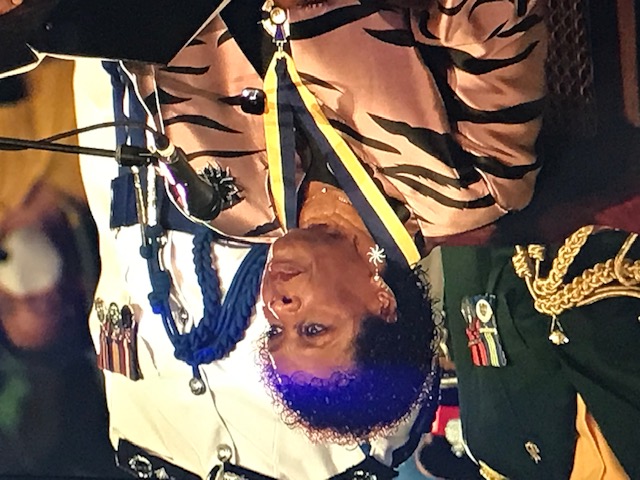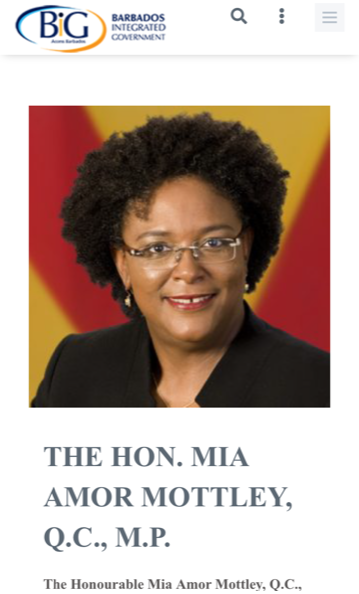Barbados: A Walk through History (Part 1)

(Barbados Yacht Club)
The View from the Yacht Club
“How about visiting the Yacht Club for its annual Christmas Lunch?” I was invited at the end of the year 2016, early on in my post in Barbados.
And thus I went out that day to the Barbados Yacht Club, nonchalantly, taking up the invitation that had been extended to me. The club looks out on the Carlisle Bay on the southern end of the island, close to the Prime Minister’s office. When I walked through the gate, a striking Colonial style building came into view.
The minute I walked into the salon where the lunch was being held I was engulfed in an unusual sense; around 150 people were already seated at the tables, and almost everyone was caucasian. Besides myself, there were only a handful of “nonwhites”, and they looked to be the spouses of the white members (incidentally, all the waiters were Black). This scene was completely different than the one of the capital city, Bridgetown, where one will see mainly Black people on the streets and in local restaurants.
On my return from an amicable and delicious meal of Barbados dishes, while reflecting on the scene I had just witnessed that spoke nothing of the reality of Barbados’ racial makeup, I thought to myself “what was going on in there?”, prompting me to do some background research on the club.
The Barbados Yacht Club was established in 1924, when the island was still under British colonial rule, and at the time of establishment the official name was the “Royal” Barbados Yacht Club. It was an exclusive meeting place for members-only, open solely to a handful of wealthy men (these types of members-only clubs still exist in areas of the world where British culture maintains a presence). An unwritten rule existed until Barbados gained its independence that “no one of color is allowed to join”.
For the sake of protecting the club’s reputation, I will say that such a rule no longer exists.
So the question remains, why were there so many white people in the room that day? The problem lies within the fact that the club is still members-only. And how does one become a member? First, prospective members need recommendations from two current members; next is an interview with the “Commodore”, the name still in use for the club president. Lastly, current members will take a vote on accepting the new candidate, and only after the candidate receives the majority of votes he can pay his member fees and finally become a member.
This laborious process presents a hurdle in increasing the number of “non-white” members.
However, even with that being said, a potential Black candidate with a credible background will not have much difficulty clearing these hurdles. In the current Barbados, if a person is denied membership because of their skin color, it is fodder for a scandal. If one wishes to become a member, it is possible.
This begs the question of why there hasn’t been an increase in the number of Black members? The reason is simple-there just aren’t many Black people who want to become one. From the perspective of the Black community, the Yacht Club is a place that from ages back is where the white people congregate, and has no relation to the Black community’s current social status or financial power, and in their eyes why bother going through all the effort of kowtowing just to become a member?
On the other hand, why doesn’t the club’s management, who states that “we are an open organization, welcoming any and all who wish to join”, get rid of this annoying exclusive members-only system? They probably have their valid reasons for maintaining it even to this day. However, in recent years the number of new members has showed sluggish growth due to the decline and aging of the white population, and even though the club’s financial difficulties should be one of their major concerns, I still have yet to hear of anyone mentioning the idea of “let anyone enter as long as they pay their club dues”.
I occasionally hear someone say that “[Barbados’] economy is still being controlled by a small group of caucasian men, even 50 years after its independence", but as of this time, I have never felt any friction between races in day-to-day life. However, the scene at the Yacht Club is one that for someone from the “outside” such as myself, is nearly impossible to comprehend, giving a glimpse into the complicated psychology rooted in Barbados’ history.
*********************************************
The island of Barbados lies in the eastern corner of the Caribbean Sea, with a population of less than 300,000 and an area of about the size of Japan’s Tanegashima Island.
Barbados became one of the British colonies in the first half of the 17th century, and at one point in time flourished as a producer and exporter of sugar to Europe. The source of workers on the sugar plantations were large numbers of slaves from Africa.
In 1966 Barbados gained independence from Britain, and became well-known with the West as a resort destination blessed with clear blue seas, white sand beaches, and sunshine. Over 90 percent of the population are descendants of former slaves; currently the president, prime minister, and all members of the Cabinet are Black, making Barbados a peaceful and stable Black-run democratic nation. The GDP per capita is approximately 15,000 USD (2020 World Bank), placing it in the world’s top 1/3 and making it a relatively high-income nation.
English is the official language, since having been ruled by the British Empire for over 300 years (footnote 1). Thus, Barbados is not part of “Latin” America, but part of the “English-speaking Caribbean", alongside the Bahamas, Jamaica, Commonwealth of Dominica, and Trinidad and Tobago and several other countries.

(View from Barbados South Coast)
Approximately four years after my first lunch at the Yacht Club, September 15th 2021.
The opening of the new parliamentary session took place at the Bridgetown Parliament building. Following in the customs of its previous ruler, Barbados’ policy speech, given at the beginning of the new session, is presented as a Throne Speech which is composed by the government and read by the Head of State.
As of 2020, the constitutional Head of State was Queen Elizabeth II; however, practically speaking it was not possible for the Queen herself to come to Barbados and give her speech. Instead, the Throne Speech was delivered by Governor General, Dame Sandra Mason on behalf of the Queen.
The term “Governor General” to refer to a local person of government is not limited solely to Barbados, but can be found in nations such as Australia, New Zealand, and Canada (footnote 2). The common factor uniting these nations is the fact that after gaining independence from the British empire, they chose to keep the monarchy as their head of state, rather than choosing a republic headed by the president.
On this day, I was invited along with other ambassadors from various countries to attend the day’s events. I sat in my assigned place and listened solemnly as Governor General Mason read aloud the Throne speech to the audience. In October 2019, Governor General Mason came all the way to Japan to attend emperor Naruhito’s enthronement ceremony, and during her trip purchased a Japanese kimono which she wore the following February at the Japanese embassy’s reception celebrating the emperor’s birthday-a true Japanophile. Which was all well and good, but I found the speech, which was drafted by Barbados’ first female prime minister Mia Mottley, to be rather long, and just as I nodded off unwittingly, the speech came to a turning point and my eyes flew open, brining me back to reality.
Governor General Mason read the following:
“Barbados has developed governance structures and institutions that mark us as what has been described as ‘the best governed Black society in the world.’ Since independence, we Barbadians have sought constantly to improve our systems of law and governance so as to ensure they best reflect our characteristics and values as a nation. Barbados’ first prime minister, The Rt. Excellent Errol Walton Barrow, cautioned against loitering on colonial premises. That warning is as relevant today as it was in 1966. Having attained Independence over half a century ago, our country can be in no doubt about its capacity for self-governance. The time has come to fully leave our colonial past behind. Barbadians want a Barbadian Head of State. This is the ultimate statement of confidence in who we are and what we are capable of achieving. Hence, Barbados will take the next logical step toward full sovereignty and become a Republic by the time we celebrate our 55th Anniversary of Independence on November 30th, 2021."
This is the moment where Barbados sent word of its desire to become a republic and that it will renounce Queen Elizabeth II, a foreigner, as its Head of State.
Actually, this talk of transitioning to a republic did not take place unexpectedly; it had been discussed since the 1990s, occasionally being hinted at by the administration of the time. However, the talk on the subject never came to fruition leading up to this day.
Citizens of Barbados have asked themselves time and time again “our ancestors were forcefully brought over from Africa as slaves to work on sugar plantations during the colonial period. As their descendants, we have overcome numerous obstacles to attain our independence. Although decades have passed since then, and as we are the leaders of our country aptly governed, why must we still look up to the Queen of the United Kingdom as our Head of State? Who are we?”
On this day in 2020, Prime Minister Mottley’s administration, with her strong leadership and widespread support among citizens, took a concrete step forward in clearing away the feelings of uneasiness that have purveyed in the hearts of citizens for many years.
Saying farewell to Barbados’ past as a British colony
On November 30th, 2021, the promised day had come. The government had been moving steadily to come through with its promise on transitioning into a republic, and on its 55th independence anniversary, it was announced at the National Heroes Square in central Bridgetown during the anniversary ceremony that Barbados would become a republic.
As the final Governor General of the monarchy era, and as the first president of the new republic (footnote 3), President Mason declared in her speech that “for fifty-five years we have had discourse and debate about the transition of Barbados to a republic. Today, debate and discourse have become action. Today, we set our compass to a new direction”. As a member in the audience that night, I witnessed the moment where the normally stout-hearted Dame Sandra Mason choked on her words as she was filled with emotion that night.
Prince Charles from the United Kingdom attended the ceremonial events, during which he gave a congratulatory speech in which he stated that “from the darkest days of our past and the appalling atrocity of slavery, which forever stains our history…Across the decades I have admired so much of what you have achieved and all you have come to represent…I shall always consider myself a friend of Barbados.”
Prime Minister Mottley, who was the leader of the transition movement, on the same day gave an address directed to the citizens of Barbados, mentioning the following: “We see this moment of this morning as a transitioning of our mental landscape. Most assuredly, we have done well as a nation to be able to take care of many of the basic needs of our people. But, have we completed our journey? No, we have not. Our ability to continue that journey depends now not on anyone from outside, but depends on us.”
Thus this is how Barbados, with both a female president and prime minister, peacefully transitioned their nation into a republic.

(President Mason giving her inaugural speech)

(Prime Minister Mottley (photo courtesy of Barbados Government website))
Whenever I receive a new assignment as a diplomat, I always make sure to research the nation’s historical background. When I found out my new assignment was Barbados, I was a bit disappointed in this sense by what I perceived as a lack of historical richness of the island nation.
Barbados is a small island in the eastern Caribbean Sea, taking only three or four hours by car to complete one lap around the country. It was not as though the island had been the center of attention on the world stage that I had ever heard of; the first thing that Japanese most likely think when they hear of Barbados is “where is that?”.
Hence I had simplified Barbados’ history to “Becomes British colony in 1627→Flourishes due to exports of sugar to Europe produced on plantations using forced slave labor→Gains peaceful independence from Britain in 1966→Parliamentary democracy takes root and becomes middle-income nation, becomes popular with the West as a resort destination” and that was the end of the story. However, when given the chance to actually live in Barbados and research various aspects, I was able to learn that it in fact has a very exciting history.
Barbados finally said “farewell” to its past as a colony on November 30th, 2021. In the following column I would like to introduce this small but beautiful country’s history to readers in Japan.
(1) In everyday life, an English-based creole language called "Bajan English" is often spoken. The white population speak in English almost no different than that of England, while most of the Black population speak among themselves Bajan English which I, as a person with poor linguistic talent, hardly understand even after five years of my life in Barbados.
(2)In addition to the three countries listed who use the position “governor general” in the Caribbean are the Bahamas, Jamaica, St. Lucia, St. Vincent and the Grenadines, Antigua Barbuda, St. Kitts and Nevis, Grenada; additionally Papua New Guinea, Solomon Islands, and Tuvalu.
(3) This president is a symbolic, non-executive position. Barbados will continue to remain a part of the Commonwealth after becoming a republic.
(This column reflects the personal opinions of the author and not the opinions of the Ministry of Foreign Affairs of Japan)
WHAT'S NEW
- 2025.1.12 UPDATE
PROJECTS
"Barbados A Walk Through History Part 15"
- 2024.12.4 UPDATE
PROJECTS
"Barbados A Walk Through History Part 14"
- 2024.9.17 UPDATE
PROJECTS
"Barbados A Walk Through History Part 13"
- 2024.7.30 UPDATE
EVENTS
"408th Lecture Meeting Regarding Global Issues"
- 2024.7.23 UPDATE
PROJECTS
"Barbados A Walk Through History Part 12"
- 2024.7.9 UPDATE
ABOUT
"GREETINGS FROM THE PRESIDENT JULY 2024"
- 2024.7.4 UPDATE
EVENTS
"APIC Supports 2024 Japanese Speech Contest in Jamaica"
- 2024.6.27 UPDATE
EVENTS
"407th Lecture Meeting Regarding Global Issues"
- 2024.5.21 UPDATE
EVENTS
"406th Lecture Meeting Regarding Global Issues"
- 2024.5.14 UPDATE
EVENTS
"405th Lecture Meeting Regarding Global Issues"




